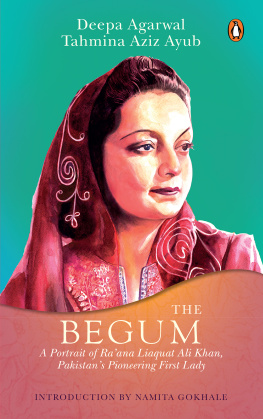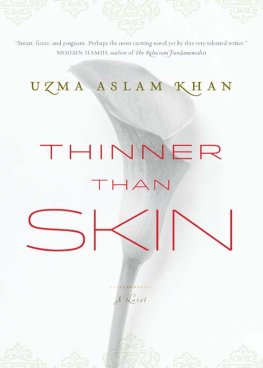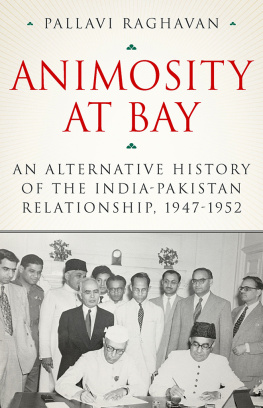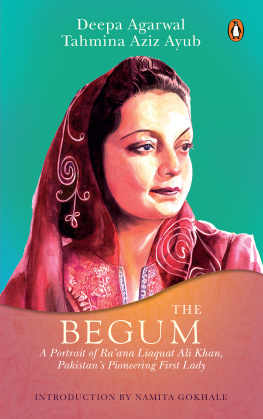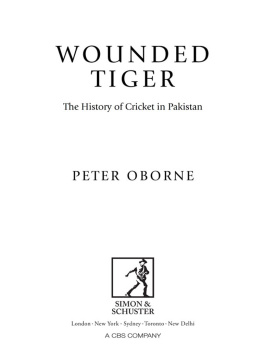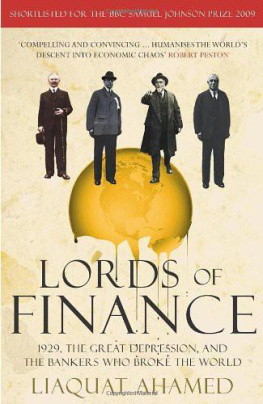ADVANCE PRAISE FOR THE BOOK
The Begum is a rare, unusual and riveting biography of Begum Raana Liaquat Ali Khan. The co-authors, Deepa Agarwal in India and Tahmina Aziz Ayub in Pakistan, have drawn on unique resources in their respective countries to create a narrativethe first everto provide an informed account of the two different aspects of a remarkable life. Agarwal explores unusual family documents to provide insights into Begum Liaquat Ali Khans early life and the social, cultural, historical and political influences which forged her: born into a Christian family of Brahmin origin in Almora, she was a strong, intelligent and determined young woman who became a professor of economics in Delhi and converted to Islam to marry Nawabzada Liaquat Ali Khan. He became the first prime minister of Pakistan. Aziz provides vivid insights into Begum Liaquat Ali Khans legendary work in the newly created Pakistan, as a great humanitarian, a womens rights activist and nationalist, and her astonishing courage when her husband was assassinated in 1951. She continued to work tirelessly for the empowerment of women in Pakistan. She also became the countrys first woman diplomat and later the first and only woman governor of Sindh. The book is framed by an excellent Introduction by Namita Gokhale and an Afterword by Laila Haroon SarfrazMuneeza Shamsie, critic and author of Hybrid Tapestries: The Development of Pakistani Literature in English
A sensitive and perceptive collaborative biography of Begum Raana Liaquat Ali Khan that brings out the rich texture of her life and times. A wonderful read about one of the most fascinating figures of modern South Asia that captures the intertwined histories of the subcontinentT.C.A. Raghavan, former Indian high commissioner to Pakistan and author of The People Next Door: The Curious History of Indias Relation with Pakistan
[About] a visionary and an intrepid patriot, The Begum weaves the personal and public lives of one of Pakistans and South Asias most alluring personalities, Begum Raana Liaquat Ali Khan. Her selflessness, dignity and fight for progressive values are sublimely chronicled in this compelling biographyRazi Ahmed, director, Lahore Literary Festival
This fascinating and adventurous book crosses borders in the best possible way. Seventy years after the event that created two countries, India and Pakistan, out of one, this joint telling of a life subverts, expands and stretches borders that seek to divide; it shows how the real-life stories of people confound the decades-old attempt to limit our histories within the boundaries of nation states. That the story is told by two women, one from India and one from Pakistan; andas Namita Gokhales Introduction highlightsthat it rescues from history the story of a woman who belonged to both countries, makes it both unusual and importantUrvashi Butalia, publisher, Zubaan and author of The Other Side of Silence
A captivating, timely and masterfully coherent portrait of a sprightly and remarkable woman that will strike a chord with women across South Asia. This page-turner is a revelation as it shines light on the little-known, myriad influences of her upbringing and stellar academic career that shaped her personality and thinking. The annexures, interviews and anecdotes are riveting, as is the moving panorama of undivided India and Pakistan in the twentieth century. A gem not to be missedAmeena Saiyid OBE, S.I. (Sitara-e-Imtiaz), founder and director, Adab Festival Pakistan
T HE B EGUM : A N I NTRODUCTION
Namita Gokhale
Reflecting on how and what to write while introducing this important biography, I wonder once again if it is one or two books I have before me. This collaborative account, co-authored by Deepa Agarwal and Tahmina Ayub, mirrors the fissures and fault lines that divided Begum Raana Liaquat Ali Khans life into two astonishingly symmetrical halves. A well-researched portrayal of an intrepid and passionate woman, it presents her personal narrative and political convictions, and mirrors the history of the subcontinent, in a timeline truncated by the uncompromising contours of the Radcliffe Line.
Sir Cyril Radcliffe arrived in India on 8 July 1947. The eminent barrister was given all of five weeks to divide up a nation, a culture, a people. His brief was to demarcate the boundaries of the two parts of the Punjab on the basis of ascertaining the contiguous majority areas of Muslims and non-Muslims. A handful of menfive persons in each boundary commission for Bengal in the east and Punjab in the westworked day and night on a hurried and ignominious exit from an increasingly precarious and unstable empire. Equal representation given to politicians from the Indian National Congress and the Muslim League, each hostile and intractable in their positions, only added to the tensions.
In New Delhi, at 8 Hardinge Road, a sprightly forty-three-year-old woman, all of five feet tall, was hastily putting together some personal belongings. Begum Raana Liaquat Ali Khan was preparing to depart in a government aeroplane for Karachi airport, where her husband Nawabzada Liaquat Ali Khan was soon to be sworn in as the first prime minister of Pakistan.
The future first lady was leaving her magnificent double-storeyed home, set in three acres of garden, for an unknown and uncertain life in a newly formed nation. This elegant colonial bungalow (now 8 Tilak Marg) had been her home since her marriage. Both her sons, Ashraf and Akber, had been born here. 8 Hardinge Road had become the focal hub for the activities of the Muslim League. Her husband had been appointed finance minister of the interim government, and indeed the papers for the interim budget presented on 2 February 1946 had been taken directly from his home to Parliament House.
Not so far away, at 10 Aurangzeb Road, Muhammad Ali Jinnah had also made preparations to depart Delhi, and India. However, he had been more pragmatic than the idealistic and high-minded Liaquat Ali and had sold his house to the industrialist Ramkrishna Dalmia for Rs 3 lakh. Liaquat and his wife Raana, on other hand, had decided to gift their home to Pakistanit was to become the residence of the new nations future high commissioner. Gul-i-Raana, the bungalow that her adoring husband had named after her, would henceforth be known as Pakistan House. Their vast and eclectic library was also gifted to the new nation in which they had invested their hopes and lives.
What were the thoughts and emotions that jostled in her mind and heart as she observed all that she had struggled for come to fruition, even as the looming shadow of Partition prepared to bathe the two nations in a fierce spasm of blood and sacrifice?

